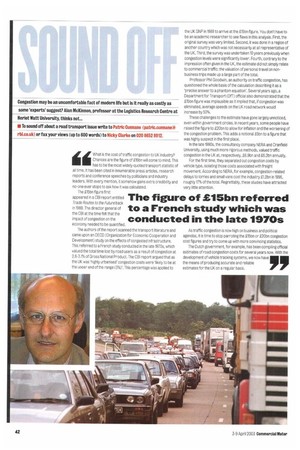What is the cost of traffic congestion to UK industry?
Page 42

If you've noticed an error in this article please click here to report it so we can fix it.
Chances are the figure of £15bn will come to mind. This has to be the most widely-quoted transport statistic of all time. It has been cited in innumerable press articles, research reports and conference speeches by politicians and industry leaders. With every mention, it somehow gains extra credibility and no-one ever stops to ask how it was calculated.
The E15bn figure first appeared in a CBI report entitled Trade Routes to the Future back in 1989. The director general of the CBI at the time felt that the impact of congestion on the economy needed to be quantified.
The authors of the report scanned the transport literature and came upon an OECD (Organization for Economic Cooperation and Development) study on the effects of congested infrastructure. This referred to a French study conducted in the late 1970s, which valued the total time lost by road users as a result of congestion at 2.6-3.1% of Gross National Product. The CBI report argued that as the UK was 'highly urbanised' congestion costs were 'likely to be at the Linear end of the range (3%)'. This percentage was applied to the UK GNP in 1988 to arrive at the £15bn figure. You don't have to be an academic researcher to see flaws in this analysis. First, the original survey was very limited. Second, it was done in a region of another country which was not necessarily at all representative of the UK. Third, the survey was undertaken 10 years previously when congestion levels were significantly lower. Fourth, contrary to the impression often given in the UK, the estimate did not simply relate to commercial traffic: the valuation of personal travel on nonbusiness trips made up a large part of the total.
Professor Phil Goodwin, an authority on traffic congestion, has questioned the whole basis of the calculation describing it as a 'precise answer to a phantom equation'. Several years ago, a Department for Transport (DfT) official also demonstrated that the 115bn figure was implausible as it implied that, if congestion was eliminated, average speeds on the UK road network would increase by 50%.
These challenges to the estimate have gone largely unnoticed, even within government circles. In recent years, some people have raised the figure to £20bn to allow for inflation and the worsening of the congestion problem. This adds a notional 15bn to a figure that was highly suspect in the first place.
In the late 1990s, the consultancy company NERA and Cranfield University, using much more rigorous methods, valued traffic congestion in the UK at, respectively, £6.9bn and £6.2bn annually.
For the first time, they separated out congestion costs by vehicle type, isolating those costs associated with freight movement. According to NERA, for example, congestion-related delays to lorries and small vans cost the industry £1.2bn in 1996, roughly 17% of the total. Regrettably, these studies have attracted very little attention.
As traffic congestion is now high on business and political agendas, it is time to stop parroting the £15bn or 120bn congestion cost figures and try to come up with more convincing statistics.
The Dutch government, for example, has been compiling official estimates of road congestion costs for several years now. With the development of vehicle tracking systems, we now have the means of producing accurate and reliable estimates for the UK on a regular basis.
































































































































































